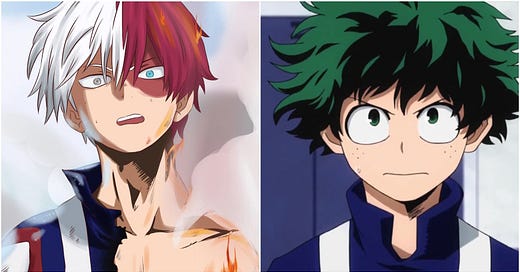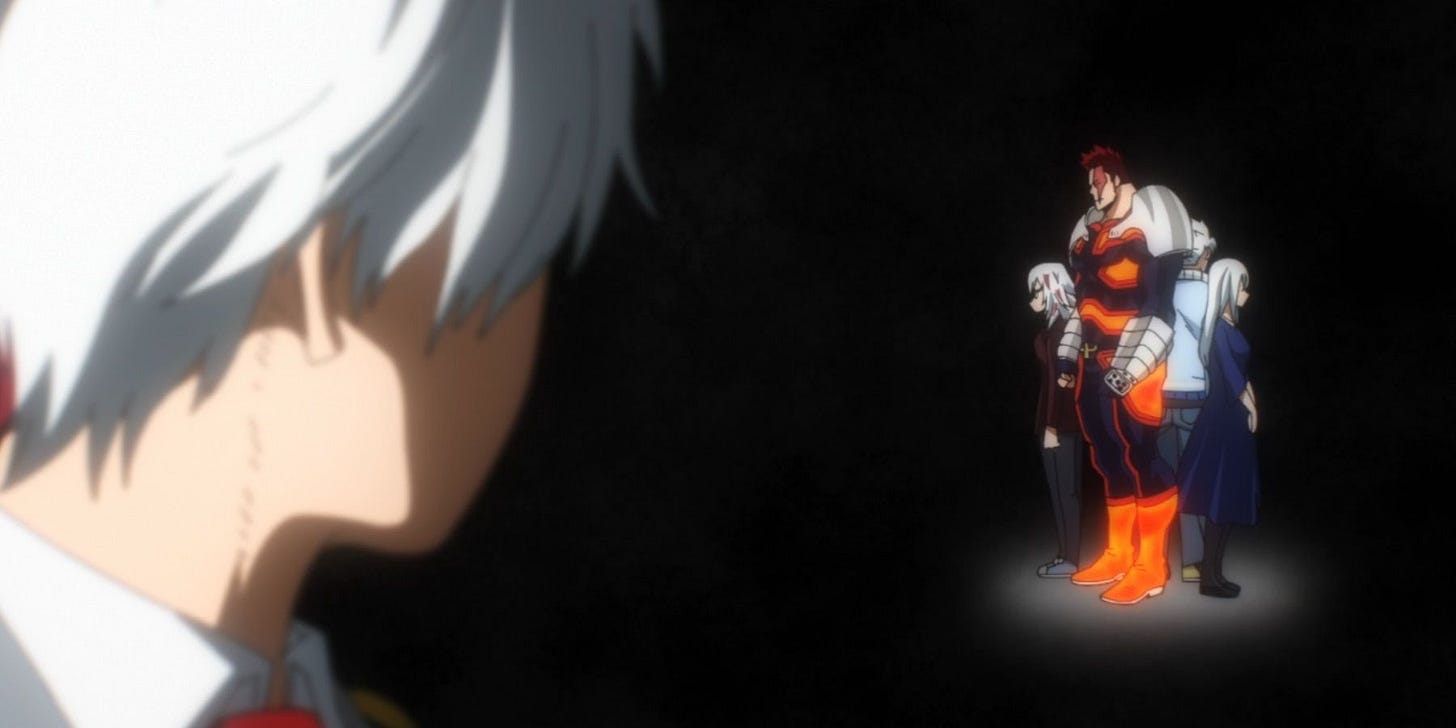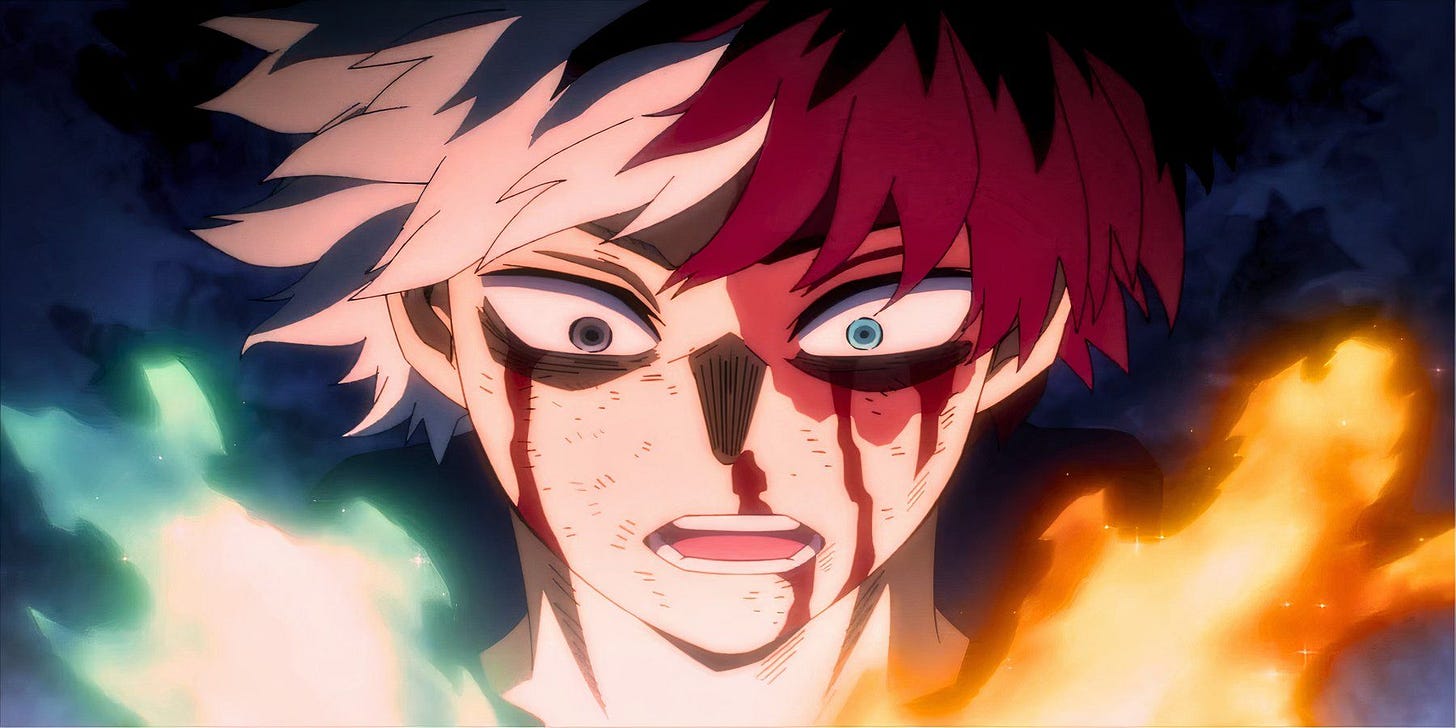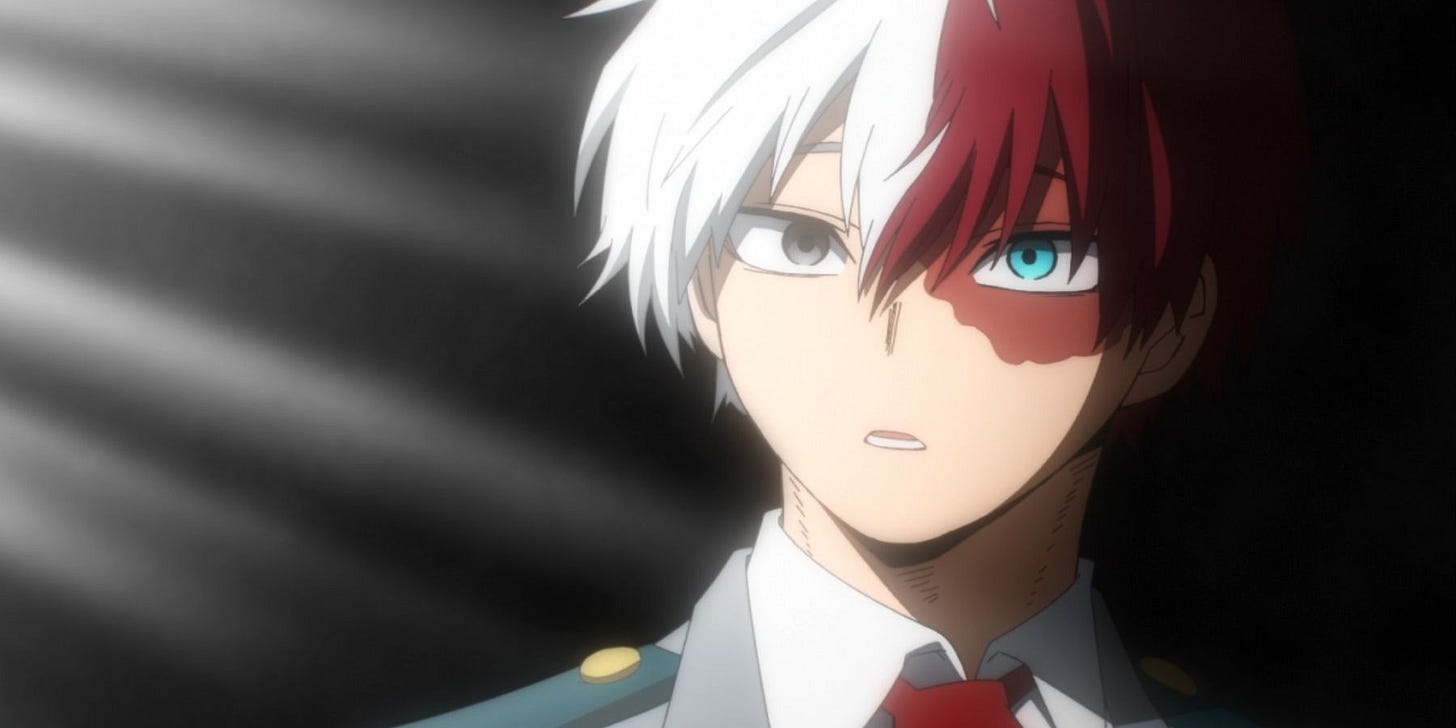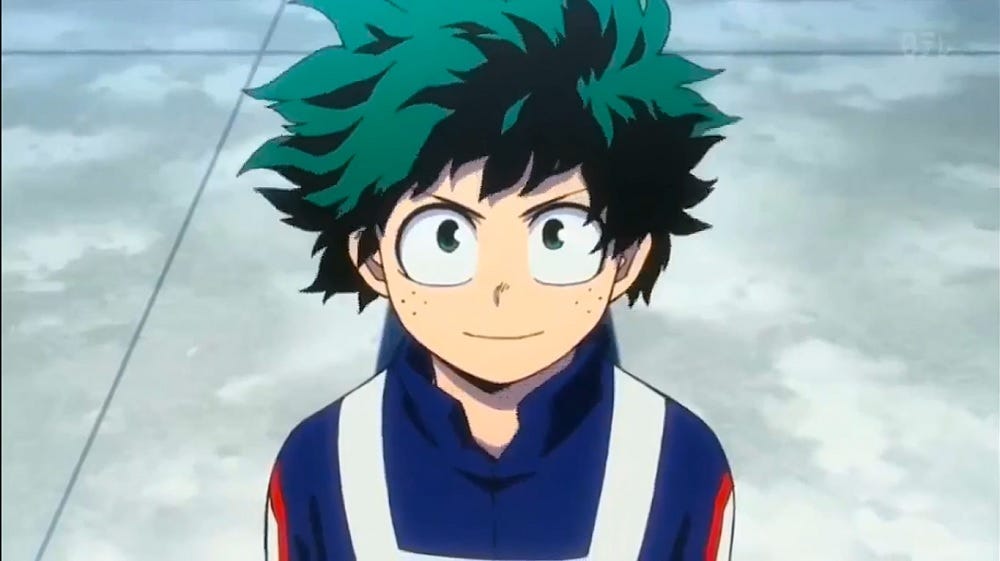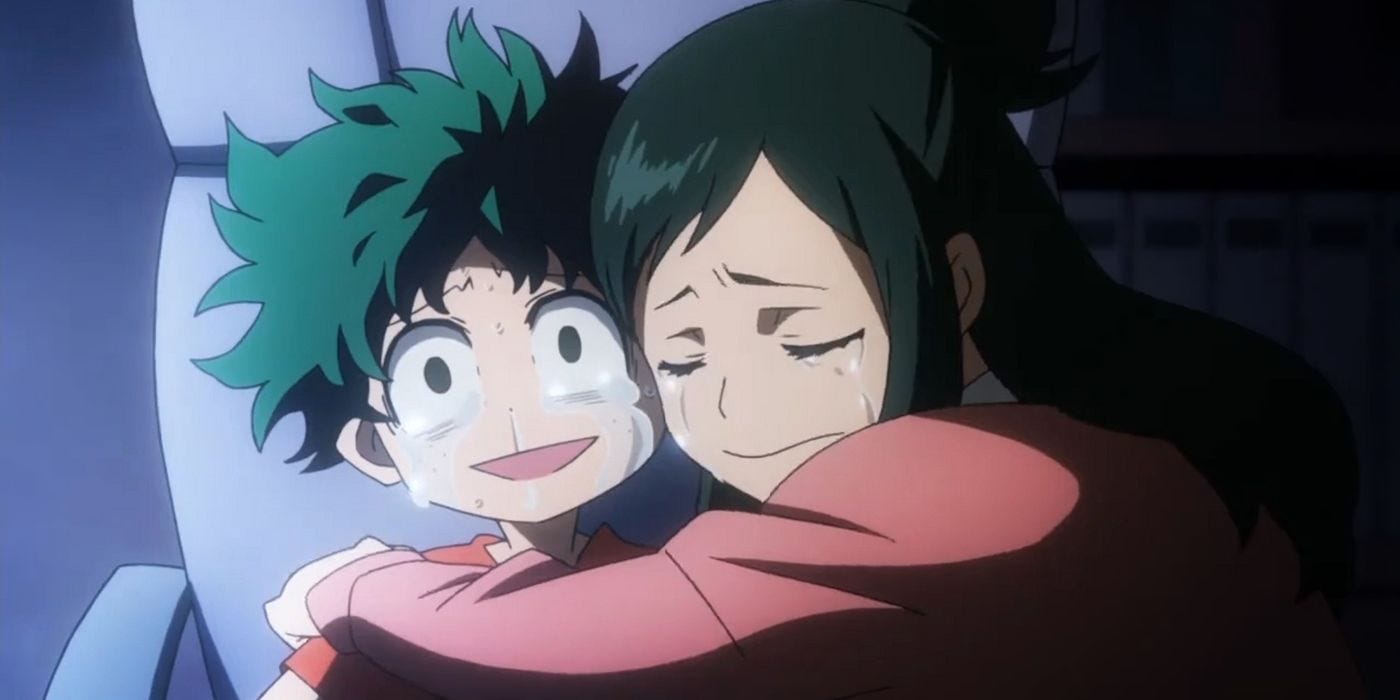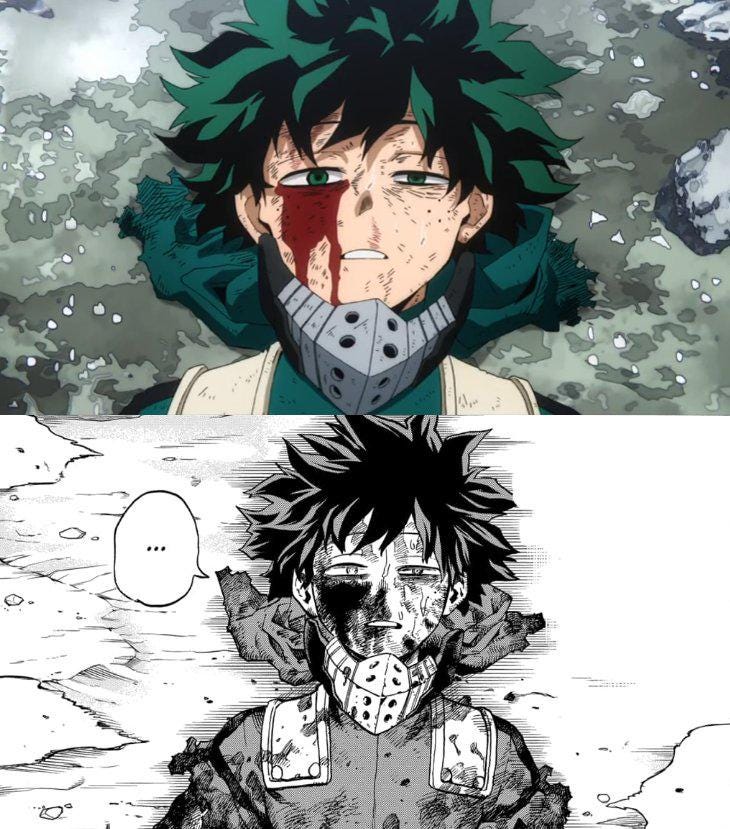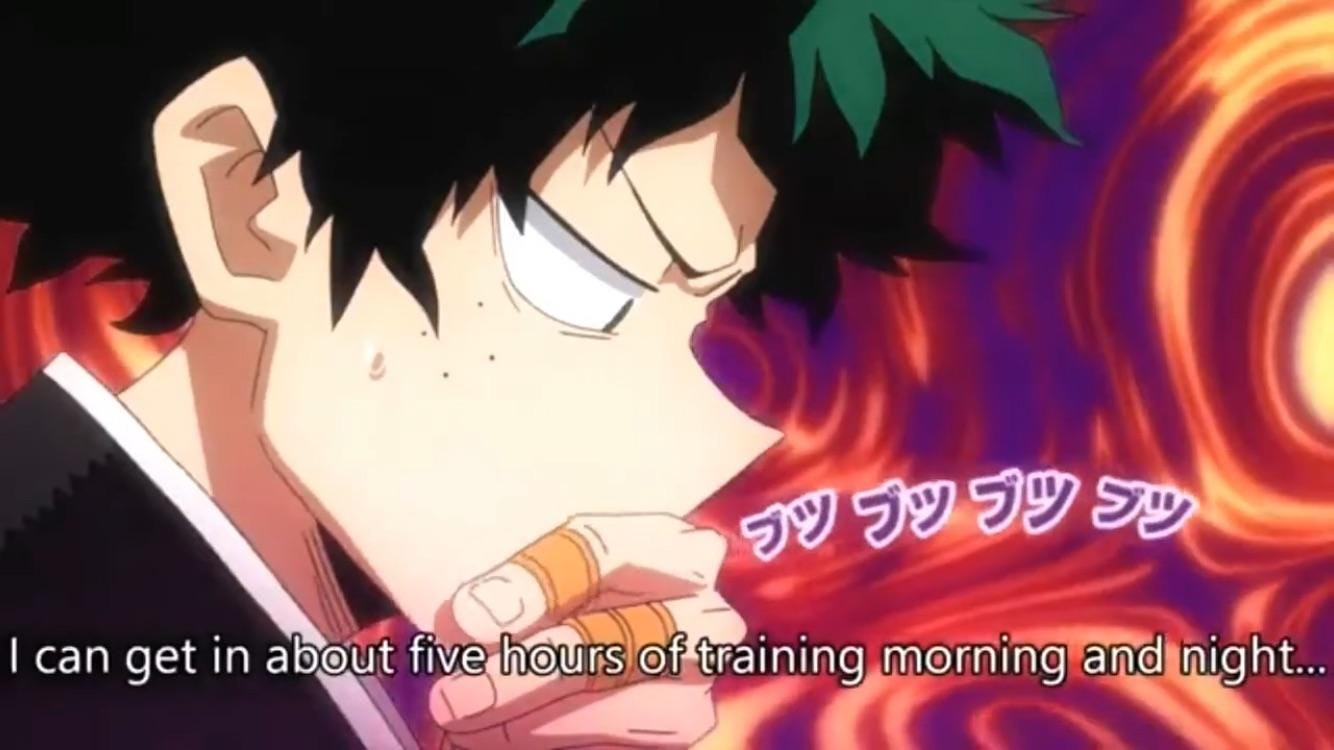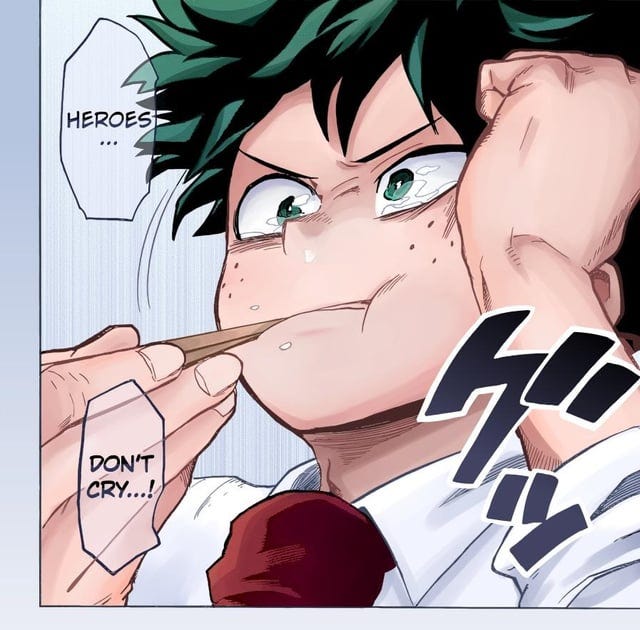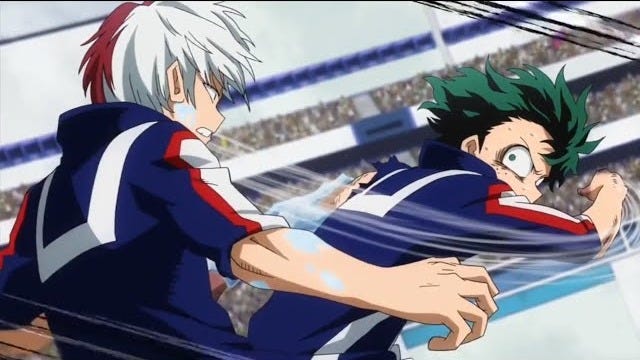The Power of Passion and the Strength to Endure Suffering
Sometimes passion leads us to suffer, and our sufferings fuel our passions.
I finally decided to catch up on My Hero Academia’s seventh season. I held off because I wanted to watch the season straight through. Horikoshi-sensei’s storytelling about the hero war is…pro-military, and with each watch-through of any season—but especially the last three—I am taken aback by how much suffering is depicted in this dark academia. So many characters go through suffering for love, connection, freedom, and their dreams; it seems every theme’s throughline is what a is character willing—or forced—to struggle for. This spirit of endurance intrigues me.
The last class of my fall Spirituality in Education course provided an enlightening lesson on why we endure the worst life experiences. We discussed the spiritual thread of hopelessness, learned helplessness, and learned hopefulness. Hopelessness is the despairing belief that present and future matters will not get better due to the past. Learned helplessness spawns from that. Learned helplessness is a psychological state of being when a person feels powerless or incapable of changing themself or their situation. It’s what untamed trauma teaches us.
So many characters in the MHA universe come to mind, but only two truly touch my heart because they are opposites in passion and suffering (and it’s not who canon tells us they are). But there are two whose passion and suffering move me to tears in different ways but for the same reason:
They NEVER lose hope.
Shoto Todoroki and Izuku Midoriya suffered from the shonen jump (enjoy my hero puns, hehe), but their passion to be a hero burned bright from the start.
The Hellish Todoroki Family
Shoto Todoroki, the Boy with Everything, including nepotism as the last son of the number-two/number-one hero, fame, wealth, and two powerful Quirks, suffered in his childhood because of the eugenics that produced his giftedness. Shoto’s character reminds us that material wealth and fame do not equate to emotional and spiritual peace.
His father, Enji Todoroki/Endeavor, wanted a Quirk marriage to produce a child who could handle his fire Quirk. After he paid for a bride with an ice Quirk and had three children who did not turn out quite as he hoped, Enji Todoroki finally got what he wanted when Shoto, the youngest of the Todoroki family with a Half-Hot, Half-Cold Quirk, was born. However, it wasn’t enough for his ego-driven patriarch. I know about the pain caused by childhood trauma stemming from an abusive father and Shoto’s experiences with tragedy and abuse—domestic violence, loss of a sibling, and physical abuse from both parents that left him psychologically and physically scarred.
The emotional fallout of parent-child separation left him socially aloof and vengeful by the time he arrived at UA. But as he develops his Quirk and trains to be a pro hero alongside his classmates and friends, his soul begins to transform the fire he suppresses because of his father’s rage.
The Boy Who Became Everything More
By the time we reach season seven, so much has happened to Shoto and his family that his character development and story arc become the most moving evolutions in the entire series.
He grows to love and care for others, trust and be trusted by others, and be grateful and thoughtful. Most importantly, he is the compassionate, wounded hero who finds internal balance to forgive his parents and lead his entire family toward their collective healing. It may not be enough for every viewer or even for every member of the Todoroki family, but s7e157 is one of the most compelling conclusions I’ve seen of an animated family go through.
This is all thanks to his developed friendship with the heartbeat of Class 1-A:
Izuku Midoriya: The Boy Born Quirkless
Izuku Midoriya is a teenage boy among the twenty percent of people born Quirkless in a superhuman society where eighty percent of people are born with a Quirk or a meta ability. He is crushed when he finds out his parents’ Quirk genes skipped him. His ultimate dream was to become a pro hero who saved everyone with a smile, like his idol, All Might.
Still, he aspires to be a hero, though in his world, it is believed that someone who is Quirkless could never be one. From childhood, Izuku was willing to risk his life—even without a Quirk—to save others in a version of Japan full of people who can do the unimaginable. So, when he fatefully inherits a Quirk called One for All from the Beyoncé of pro heroes and is admitted into UA’s hero course (with Shoto Todoroki and others), his altruism becomes martyrdom more often than not. He puts others’ lives on his back, mourns with those who are grieving, and rarely blinks to think about the consequences saving another soul from a villain or environmental calamity will cost him.
The Nerd, The Hero, The Savior, The Student
Izuku’s so much like me: an INFJ, a crybaby hero, and a nerd passionate about their geeky special interests. His diligent and courageous approach to his hero academy training reminds me of what I learned in the “Fostering Transformative Learning” class this past fall. Watching Izuku makes me wonder how my Spirit and I would be in a Hero Society. Who would I focus my hero work on? How selfless and helpful, how reckless and heroic would I be? Would I strive to be a hero even if I were Quirkless? Do I know myself well enough to put my values to the test in the face of mortal danger? Could I embody my spiritual and social beliefs to the point of risking my life for others without a second thought? I don’t know without looking within.
In the adult education pedagogy of Transformative Learning Theory, self-surveillance is a concept that adult learners experience while learning new things. Self-surveillance is how we monitor ourselves, mainly our bodies, in learning environments. It’s uncomfortable learning something new, but that awkwardness is a spiritual experience, and such experiences influence our temporal world and our relationship with others. I engage in self-surveillance as part of my spiritual framework, and it stems from my role as an autistic student. I've always enjoyed learning and being a student, and I take it seriously, challenging myself to do my best in every course. Like Izuku, suffering makes me cry, and sometimes my passions make me feel weak.
Throughout the series, Shoto learns the depths of empathy, emotional vulnerability, and heroism from Izuku. However, in season five, when Izuku holds the suffering of an innocent little girl in the pit of his chest and tells himself that heroes don’t cry, Shoto tells him what I know to be true: “Heroes cry when they need to.”
The Somaesthetics of Suffering and Hope
Like Izuku and Shoto, as they matriculate through the prestigious UA, I am determined to focus more on pursuing an enriching experience that will make my time in the program worth the exploration and Ivy League cost. Sometimes, my overthinking brain wrestles with my perceived performance in class, but I've been intentional about following through with my personal goal to maintain balance. So when I saw how grading would happen for this class, I immediately chose the grade that I wanted and unwittingly began to hyperfocus on my performance thus far, surveilling how I show up to succeed.
Funny enough, I have been taught by professors and have read literature from scholars who are less concerned with grades than the student's learning experience. These two would be at odds if I didn't commit to not hyper-fixating on grades this learning season, but I intend to focus on how to wrestle with my spiritual sufferings through the power of knowledge. That is my strength and my Quirk.
In an earlier MHA newsletter about “Struggle as an Aesthetic Experience,” I explored my theory of suffering as a somaesthetic/psychosomatic experience. Suffering is a psychospiritual and emotional dissonance that results from one’s internal state not matching up with one's external state. The chasm between the parallel yet mutually real experiences creates a void where sadness, despair, resentment, and hopelessness can pool into suffering. It is there that the sufferer is either consumed or refined.
In Hero Society, villains are consumed by their suffering, and heroes are refined by their suffering.
The labels are divided by what we choose to do with our pain and how we channel our passions. But the world’s strongest heroes in the MHA universe, those with the most extraordinary power, have also experienced a depth of pain that makes me ask, “Is it worth it?” I don’t know what the “it” is, to be honest, because, in a society that classifies people by their spiritual and creative gifts and meta powers, class divisions and social divisions within that structure mimic our reality. People use their unique gifts and talents for social good, and there are those who use their power for corruption.
So, what are we doing now with our gifts and talents to push through our present sufferings? What am I doing with my quirks, and how am I expressing my passions?
I’m creating art to refine my voice and perspective on the world in creative and literary ways. I am learning, teaching, and figuring out my role in modern society and what I owe to the people (including animals and plants) with whom I share this world. But I do know that sometimes, when I’m quiet enough to listen to that still voice within my spiritual core, I hear her telling me, "You, my dear, are destined for greatness.”
Hope in the Future
Izuku Midoriya and Shoto Todoroki grow up to become the world’s greatest hero and Japan’s Number Two hero, respectively. But that did not come without blood, sweat, tears, and war. There is something bigger, something greater within me that pain has brought forth. So, it brings me a sense of hope that my purpose in this life serves more than just me. But when the message comes from my spirit to me, it hits differently—like a life mission. There is an internal passion that cannot be superimposed upon by external influence— a passion born of suffering and struggle that succeeds under stress and fire.
“You therefore, my son, be strong in the grace that is in Christ Jesus. And the things that you have heard from me among many witnesses, commit these to faithful men who will be able to teach others also. You therefore must endure hardship as a good soldier of Jesus Christ. No one engaged in warfare entangles himself with the affairs of this life, that he may please him who enlisted him as a soldier. And also if anyone competes in athletics, he is not crowned unless he competes according to the rules. The hardworking farmer must be first to partake of the crops. Consider what I say, and may the Lord give you understanding in all things.”
II Timothy 2:1-7 NKJV

